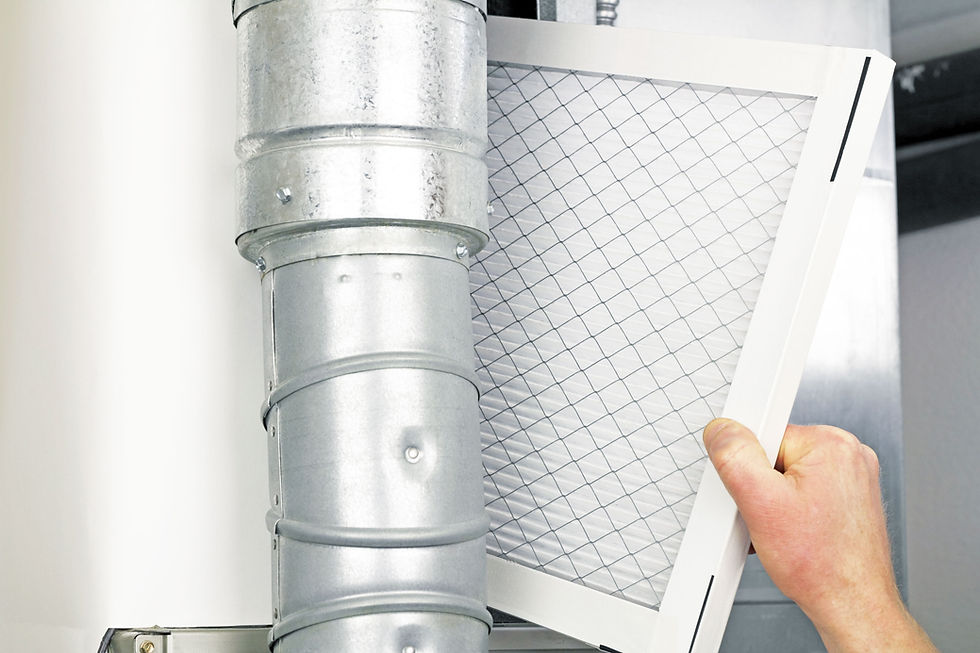Protect Your Indoor Air Quality: How Changing HVAC Filters Can Safeguard Against Wildfire Pollution
- Empire Air Duct

- Jun 8, 2023
- 3 min read
Updated: Jun 10, 2023

As wildfires continue to wreak havoc across various regions, the detrimental effects of wildfire smoke on air quality cannot be ignored. The thick plumes of smoke contain hazardous particles and pollutants that can penetrate indoor spaces, compromising the air you breathe.
This post may contain affiliate links which means we may receive a commission for purchases made through links. In this article, we will also focus on the significance of changing air filters as a crucial measure to safeguard your home against wildfire smoke pollution. By taking this simple yet effective step, you can significantly improve indoor air quality and protect the health of your loved ones.
Air pollution is a significant environmental issue affecting the health and well-being of people worldwide. The increasing levels of pollutants in the air pose a range of challenges, from respiratory diseases to climate change.

Air pollution stems from various sources, both natural and human-induced. Natural causes include volcanic eruptions, wildfires, and dust storms. However, human activities contribute significantly to air pollution. The burning of fossil fuels for energy production, industrial emissions, vehicular exhaust, and deforestation are major human-generated sources of air pollution. Air pollution has detrimental effects on both human health and the environment. Short-term exposure to polluted air can lead to respiratory problems, allergies, and aggravated asthma symptoms.
Currently we are dealing with air pollution caused by wildfires. Wildlife can have both direct and indirect effects on the air quality. Air pollution poses a significant threat to human health, ecosystems, and the global environment. By understanding the causes, effects, and solutions to combat air pollution, we can work together to reduce emissions, improve air quality, and create a healthier and more sustainable future for generations to come.

When it comes to HVAC units and your indoor air quality there are several types of air filters available to meet different needs and budgets. Here are some common types of air filters for HVAC units:
Fiberglass filters are inexpensive and widely available. They are constructed with layered fiberglass fibers and are designed to capture larger particles like dust and lint. While they are not very effective at trapping smaller particles or allergens, they provide basic filtration for HVAC systems.
Pleated filters are made of polyester or cotton paper material folded into pleats. They offer a greater surface area for capturing particles and can trap smaller particles such as pollen, pet dander, and mold spores. Pleated filters are available in different MERV (Minimum Efficiency Reporting Value) ratings, indicating their filtration efficiency.
High-efficiency filters, also known as HEPA (High-Efficiency Particulate Air) filters, are highly effective in capturing a wide range of airborne particles, including allergens, dust mites, bacteria, and even some viruses. These filters are particularly beneficial for individuals with allergies or respiratory conditions. However, it's important to ensure that your HVAC system is compatible with HEPA filters, as they can restrict airflow in systems that are not designed to handle the increased resistance.
Electrostatic filters use an electrostatic charge to attract and capture airborne particles. They are available in both disposable and washable versions. These filters can be effective in capturing smaller particles, but their efficiency may vary. Washable electrostatic filters need regular cleaning to maintain their effectiveness.
Activated carbon filters are designed to remove odors, gases, and chemical pollutants from the air. They contain a layer of activated carbon, which absorbs and traps these substances. These filters are often used in conjunction with other filter types to enhance overall air quality.
It's important to choose an air filter that suits your specific needs and HVAC system requirements. Consider factors such as filtration efficiency, MERV rating, airflow resistance, and manufacturer recommendations when selecting the right filter for your HVAC unit. Regularly replacing or cleaning your air filter is crucial to maintain optimal filtration and ensure the longevity of your HVAC system. Here is the link where you can search for the best suite for your HVAC unit.
To get peace of mind It is recommended to change the filters especially if there are wildfires causing air pollution in your area. Wildfire smoke can contain harmful particles and pollutants that can negatively impact indoor air quality. By regularly replacing your HVAC filters, you can help remove some of these pollutants and improve the air quality inside your home or building. It's also a good idea to follow any local guidelines or recommendations regarding air quality and wildfire smoke.
Remember, this article provides a general overview of air pollution. For more in-depth information or specific details, it's recommended to refer to scientific studies, reports, and environmental organizations dedicated to this issue. Also consider Cleaning Your Entire Air Duct System .
Please see links where you can purchase filters or schedule best air duct cleaning service for your home.




Comments